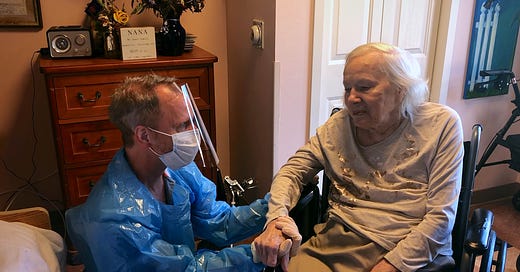Time Passages
A filmmaker chronicles his mother's descent into Alzheimer's, but along the way offers a sensitive exploration of their relationship and how we reconcile our individual burdens.
When I wrote my homage to the late, great Edward Johnson-Ott upon his passing almost four years ago, I was initially embarrassed when I realized the piece had become as much about me as it was about Ed. It felt like an act of egotism, putting myself alongside him center stage when I was trying to honor someone I loved.
It was only after some time had passed I realized it’s impossible to disconnect our own emotions and memories from those we cherish. We can’t share their story without including our own.
This is very much what the affecting documentary, “Time Passages,” by Kyle Henry is about.
The Chicago-based filmmaker and Northwestern University professor knew he wanted to memorialize his mother, Elaine, as she entered the late stages of Alzheimer’s disease. So he began recording their interactions, their Zoom calls during Covid lockdown, saving her increasingly incoherent voicemail messages, and so on. If nothing else, it would serve as a sort of journal of her latter days for her family to cherish.
But eventually a more ambitious project took shape, which became the incredibly rich experience of “Time Passages.” It’s part biography, combing through photos and letters of her youth and young womanhood, part portrait of a mind gradually graying out to disease.
Mostly, though, it’s a sensitive exploration of their relationship and how we reconcile our individual burdens. Kyle was very close to his mother, and the mix of deep love, guilt and loneliness we see is a universal reflection of the evolving roles of parent and child as we age.
It made me think deeply about my relationship with my own parents, one living and one dead, as well as others whose lives have intersected with mine. It’s likely people with a loved one experiencing dementia will be most affected by the documentary, but I found its appeal broader and deeper than perhaps even Kyle Henry intended.
“Time Passages” is making its way around the country at intimate one-off screenings. I was able to attend the Indianapolis one at Kan-Kan Cinema, where Henry was present and took questions afterward from the audience. Starting in April, the film will be available through the Kanopy streaming service and at public libraries.
It can be heartbreaking at times, such as video calls where Kyle sings old songs from the 1940s and ‘50s when Elaine was a teen and young woman, partly as a way to connect but also to stir her failing mind. She often can’t come up with the words, but hums the tunes from her formative years.
There are also home movies aplenty, picture of her youth, stories of her adventures, etc. Elaine came from a blue-collar background and after working a few years post-high school, put herself through college. She was a gifted artist — as seen by many of her paintings Kyle drops into the movie like lovely punctuation — but ultimately became an arts teacher.
Like a lot of women of her generation, Elaine came too early to express herself as a feminist but clearly felt the pull of independence and self-assertion. In conversations recalled by Kyle, she took pride in having the ability to earn her own money, so that if she ever wanted to divorce her husband, she could. Of course, when a college-age Kyle finally challenged her to do so if she was unhappy, she seemed appalled at the idea of walking out.
Kyle uses a couple of really interesting ways to portray these remembered conversations. Firstly, through stop-motion animated wooden toy figures, crayoned to look like members of the family. Kyle had four older siblings, the nearest eight years apart, as he clearly was the “accident” baby. When he came out as gay at age 20, it formed another potential divide between them.
Even more stirring are several scenes where the filmmaker dresses up as his mother, with an obviously fake wig and glasses, playing Elaine (and with not a small resemblance to Dana Carvey’s “Church Lady”). They then have several conversations, including Kyle’s reticence about making this documentary and even portraying her in this conversation.
Rather than a gimmicky, fourth-wall-breaking ploy, these scenes represent the beating heart of the movie. You might say this dialogue is unfair because his mother is not there to represent herself and speak her own words. But the exercise is still filled with Elaine’s presence because we see how Kyle really felt about her, and how (he believes) she felt about him.
Beautifully shot and edited with great craftsmanship — Henry worked for 15 years as a film editor — “Time Passages” is a beautiful movie about pain and loss, but moreso about the love they replaced. It’s an homage to an ordinary person and her relationship with her son, told with extraordinary grace.





